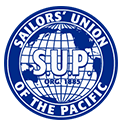A key international agency ruled on March 19, that the Bush Administration?s National Labor Relations Board (NLRB) is denying workers? rights in violation of international labor standards.
President Bush?s budget proposal for Fiscal Year 2009, is a slap in the face to America?s working families who are already struggling to get by in an economy sinking under the weight of this Administration?s disastrous policies.
Patriot Contract Services was notified by the U.S. Navy?s Military Sealift Command late last month that it was successful in its bid to operate two Special Mission Ships ?USNS Hayes and USNS Waters.
Former U.S. Transportation Secretary Norman Y. Mineta this month called for a sweeping overhaul of federal maritime policy that would be centered in a revitalized Maritime Administration to preserve national economic strength.
Election of Officers and
Constitution Referendum
American President Lines announced this month that it intends to shift its U.S.-flag C-11-type vessels (APL China, APL Korea, APL Philippines, APL Thailand, APL Singapore) to a new 38-day Pacific Coast Express service that will call Los Angeles, Oakland, Japan, Korea and three ports in North China.
The required documentation for professional mariners just got a lot tougher.
The fight to scuttle a Bush Administration 2008 budget proposal to divert 25% of food aid shipments from the United States to cash under Public Law 480 Title II Food for Peace program, has shifted to the Senate. The House of Representatives solidly defeated the request...
A provision in the massive National Defense Authorization Act for Fiscal Year 2007 passed in the dying days of the Republican-controlled 109th Congress, has capsized nearly a century of maritime law regarding citizenship requirements for merchant mariners in U.S.-flag vessels.
In a testimony before the House Transportation and Infrastructure?s Subcommittee on Coast Guard and Maritime Transportation on July 12, the Sailors? Union of the Pacific, and other maritime unions, told members of Congress that the implementation of the long-delayed Transportation Worker Identification Credential program must enhance the security of the Nation?s transportation system, but must also preserve the legitimate rights of workers.


